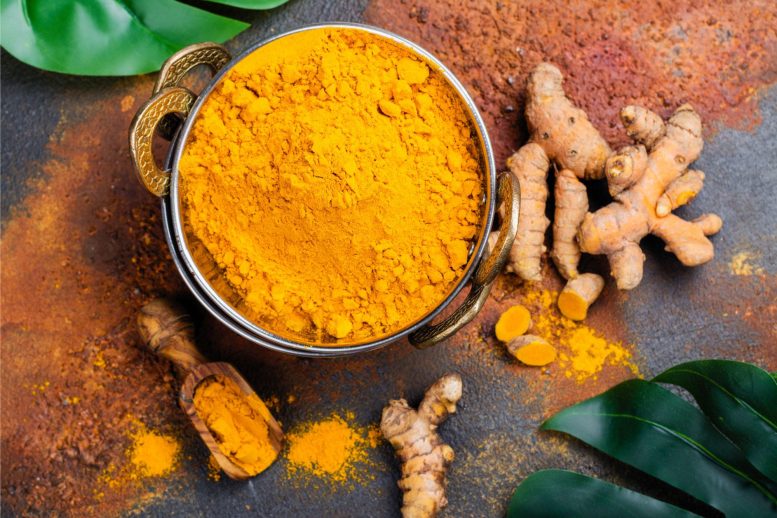
Posted on 02/03/2025 5:09:31 AM PST by Red Badger

Curcumin, a compound in turmeric, aids muscle recovery and reduces inflammation after exercise, according to UOC researchers. Optimal results depend on dosage, timing, and bioavailability.
A review of scientific literature conducted by the UOC has found that consuming moderate doses of curcumin, the active compound in turmeric, may support muscle recovery and help reduce pain after intense physical activity.
The turmeric plant, part of the ginger family, has been valued for thousands of years as both a spice and a natural food dye in cooking. Its stem produces a yellow or reddish substance, depending on the species, which is a key ingredient in curry – a popular dish originating in Asia that has gained global recognition.
Beyond its culinary uses, turmeric and its active compound, curcumin, have long been integral to traditional Asian medicine. In recent decades, extensive research has been conducted to explore the properties of curcumin, its effects on the body, and the potential health benefits of consuming turmeric.
Now, researchers in the Epi4Health group at the Universitat Oberta de Catalunya (UOC) have found that turmeric and its related products, such as curcumin, may be able to reduce muscle damage and inflammation in the musculoskeletal system following vigorous physical exercise.
“Both pre- and post-exercise curcumin consumption are associated with better outcomes in terms of muscle recovery, reduced pain, and improved antioxidant capacity,” said Daniel Vasile Popescu-Radu. He is a pharmacist and nutritionist who is simultaneously studying for a doctoral degree in Health and Psychology and a Master’s Degree in Food for Physical Exercise and Sport at the UOC. He is the lead author of the article, developed under the supervision of his tutor Patricia Martínez, a dietician and nutritionist and course instructor at the UOC’s Faculty of Health Sciences, and alongside the experts Laura Esquius de la Zarza, a member of staff at the Faculty of Health Sciences and director of the University Master’s Degree in Food for Physical Exercise and Sport, and Marta Massip, a member of the same faculty.
Hundreds of scientific studies have demonstrated the benefits and potential of curcumin, particularly as regards its properties. In fact, this supplement is well-known for its antioxidant and anti-inflammatory properties. However, the experts’ novel contribution is the confirmation of these findings in the realm of sports through a review of the scientific literature, which was recently published in open access in the Journal of the International Society of Sports Nutrition.
“The aim of this study was to assess the scientific evidence regarding the effectiveness of curcumin in mitigating exercise-induced muscle damage, such as injuries to muscle fibers, pain, and reduced strength, and establish its ability to lower inflammatory markers, improve pain perception and speed up muscle recovery when consumed by trained participants,” said Popescu-Radu. “The effective use of curcumin is contingent upon factors such as dosage, bioavailability, and time of consumption.”
Benefits of curcumin
According to the authors, the possible benefits of curcumin include mitigating and combating various issues, such as local muscle inflammation and systemic inflammation, as well as oxidative damage resulting from the increased production of free radicals during physical exercise and muscle pain, thus improving the individual’s subjective perception of pain and the affected muscle group’s range of movement.
“Moderate curcumin intake within the established post-exercise dosage range helps improve and speed up muscle recovery,” said Popescu-Radu, who also explained that “there’s always room for professional supervision, as an expert can adjust the dosage and timing of intake to optimize its benefits.”
Specifically, the experts estimate that a daily curcumin intake of 1-4 grams is enough for people in good health to enjoy these benefits, particularly in relation to eccentric exercise, which tends to be the most damaging to athletes. “The effective use of curcumin is contingent upon factors such as dosage, bioavailability and time of consumption, with the most significant benefits seemingly resulting from post-exercise consumption,” said Martínez.
Absorption and patient profile
However, despite these proven benefits, the experts emphasized that factors that must be taken into account include hormonal effects and individual patient or consumer characteristics, as well as the time of intake and the exact formulation used.
“The absorption and bioavailability of curcumin may be affected by the formulation used or the presence of other substances, such as piperine. Furthermore, the varied makeup of the participants in the studies makes it very difficult to extrapolate these results to female athletes or to specific circumstances, such as perimenopause and menopause,” said Popescu-Radu.
The experts cautioned that, although all these studies show the potential of turmeric as a supplement for athletes, further research, with larger samples, is required in order to confirm and consolidate these findings.
“Curcumin could greatly enhance the well-being of those who engage in regular physical training. It may even play a significant role in reducing inflammation biomarkers and improving antioxidant capacity, among other health benefits,” they concluded, while warning that further research into formulation, absorption, bioavailability, and other factors remains necessary to properly evaluate the effects described.
Reference:
“Evaluation of curcumin intake in reducing exercise-induced muscle damage in athletes: a systematic review”
by Popescu-Radu Daniel Vasile, Martinez-López Patricia, Massip-Salcedo Marta and Esquius Laura, 2 December 2024, Journal of the International Society of Sports Nutrition.
DOI: 10.1080/15502783.2024.2434217
This UOC research contributes to UN Sustainable Development Goal (SDG) 3, Good health and well-being.

I take it with my v&m, and I don’t even exercise. I went to my health club, one of those card-access storefront places, and as usual there was no one around. The manager was so happy to see another human being he came out, all talkative, with a dust mop, and started clearing all the cobwebs. :^)
America: We drive SUV’s two miles to a gym to walk on a treadmill..............
We take tumeric everyday for arthritis and it works incredibly well.
Just be aware there are some side effects, too.
Dangers of curcumin include:
• Digestive symptoms, such as upset stomach and diarrhea
• Blood thinning, which can result in easier bleeding
• Iron deficiency due to binding with iron
• Liver injury
• Lead poisoning
• Allergic reactions
• Headache and nausea in some cases
• Skin rash (rare)
• Stomach irritation and kidney stones if consumed excessively
Health / life BUMP!
I find my best workout is to pick up a jamocha shake, then drink it here, and Watch the hamster is run in that wheel of his.
Be aware that turmeric can interact with prescription medicines.........
From Brave AI:
Turmeric can interact with several prescription medicines, potentially affecting their efficacy or causing side effects. Here are some key interactions:
Blood Thinners: Turmeric can enhance the effects of blood-thinning medications like warfarin (Coumadin), clopidogrel (Plavix), and aspirin, increasing the risk of bleeding. If you are on these medications, consult your healthcare provider before using turmeric supplements.
Diabetes Medications:
Turmeric may potentiate the effects of drugs used to lower blood sugar, such as glyburide, leading to a risk of hypoglycemia (low blood sugar). Monitor your blood sugar levels closely if you are taking diabetes medications and consuming turmeric.
Stomach Acid Reducers:
Turmeric can counteract drugs that reduce stomach acid, such as cimetidine (Tagamet), famotidine (Pepcid), ranitidine (Zantac), and omeprazole (Prilosec), potentially increasing stomach acid production and causing nausea, bloating, and stomach pain.
Iron Supplements:
Turmeric may interfere with the absorption of iron supplements, potentially affecting iron levels in the body.
Other Medications:
Turmeric can interact with a wide range of other medications, including those for high blood pressure, heart disease, and cancer treatments. It’s important to consult a healthcare provider before combining turmeric with any prescription drugs.
Always consult your healthcare provider to ensure the information applies to your personal circumstances and to avoid potential interactions.
While discussing remedies, I’ll hijack the thread. I read yesterday about the interaction of CBD with a list of various drugs.
CBD (Cannabidiol) is said to be effective for chronic arthritis and such pains. It has been approved for sale in Tennessee and may in fact be effective. Someone very close to me experiences chronic arthritic like pain and has found no truly effective remedy.
Unlike real marijuana, it apparently does not have the same objectional effects.
Thoughts, experience?
I take famotidine for acid reflux everyday and there is zero problem. Mr. GG2 takes blood pressure meds and turmeric no problems.
Turmeric is a spice. Unless you are ingesting large amounts its fine. The amount you need to take for arthritis control is about as much as you would get eating at an Indian restaurant.
Most of this anti supplement so called expert information is from big pharma. The reason we aren’t on 40 different meds is because of all the supplements we take daily.
Be very wary of this study. Yes, some curcumin can improve muscle recovery. But too much can reduce testosterone levels significantly and men should be aware of this. In fact, there has been a study that the extreme levels of curcumin consumption among male Indians accounts for their complete lack of gold medal performance at every Olympics.
Never tried any cannabis medications or supplements. They are way overpriced..............
Curcumin is but one of many polyphenol dyes which a LARGE portion of people are highly allergic to. And by the way, allergy is another term for autoimmune disease.
😆
I may knock off the turmeric for a while, see what happens. My doctor knows about it, didn’t seem to be concerned.
If turnmeric is part of the ginger family, does that mean there could be health benefits to eating ginger snaps?
Doctors tend to pooh-pooh home herbal remedies.......
Yes. You will gain prodigious amounts of fat.........
Weirdly enough, my doctor’s *name” is Winnie...
Disclaimer: Opinions posted on Free Republic are those of the individual posters and do not necessarily represent the opinion of Free Republic or its management. All materials posted herein are protected by copyright law and the exemption for fair use of copyrighted works.